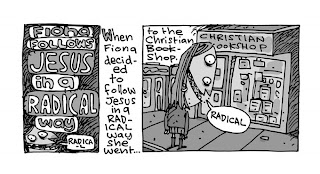
People who know me well know how much time I spend at bargain sections of bookstores primarily because it is the best place to find theological books at dirt cheap prices. Two weeks ago I was able to buy a copy of John F. Kavanaugh’s Still Following Christ in a Consumer Society.
The book was first published when the “greed-is-good” decade of the 80s was just beginning, where words like ‘globalization,’ the ‘WTO’ and ‘free trade’ were still buzzwords in economic circles; and Evangelical Christianity is still getting itself acquainted with Republican Politics and yuppie middle-class consumer culture.
What captured my fancy with this book as I began to read it this afternoon is the fact that it finely articulates the subtle flaw that springs out of what most of us has come to call as neo-conservatism within Evangelical Christianity:
“The rise of the “new conservatism” is a case in point. As I see this movement, often associated with morality and a form of Christian faith, it is not conserving of what is richest and deepest in human beings, but a preserving of ourselves from the facts. It is conservatism not of principle, but of pragmatism. It hungers for the legitimations of power and prestige-especially economic, military and ideological. And it represents all suggestions that right order has yet to be achieved in our country. It is a conservatism of self-interest.I believe that this statement is even more appropriate today more than it was in the 80s. The book is a really penetrating diagnosis of our culture of consumerism as contrasted with the personalism of the Christian Gospel, which speaks of a God who ‘became flesh and made His dwelling among us.’
This new conservatism is the fruit of two complementary but dangerous tendencies: the tendency to separate faith from the work of justice (active love and service) and the tendency to equate faith with a particular form of social, political or national power.”
In the book Kavanaugh speaks to the socially concerned, showing why working for peace and justice needs to support a culture-transcending faith. While to believers, the authors show how authentic faith requires doing justice –in our society, in our places of work, in our places of worship, and our personal lives.
The book offers glaring contrast of the Gospel’s meaning and social implication to that of the present Conservative Right’s support to post-911 foreign and humanitarian policy as well as on issues as varied as pre-emptive war, the environment, foreign debt, human rights and militant Islamic fundamentalism.


No comments:
Post a Comment